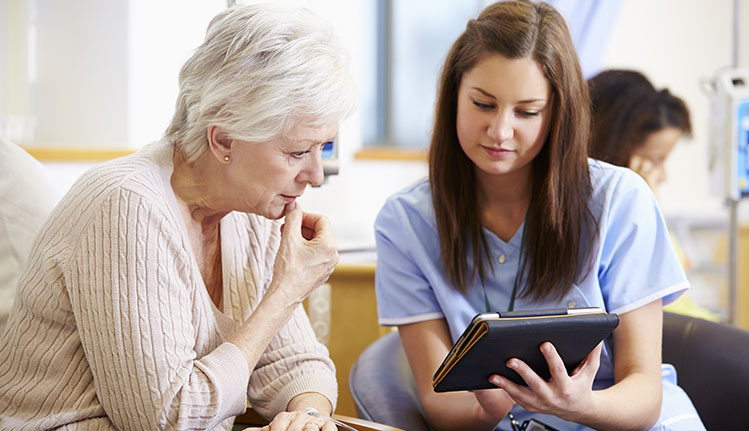The key to irritable bowel syndrome treatment is to understand what is causing it in the first place. There are numerous possible causes, and each will require a specific treatment in the short term, either medical, non-medical, or a combination.
In the longer term, there are different changes you can make to alleviate your symptoms, such as a change in diet and eliminating the foods that are causing gut sensitivity. If stress factors are your main trigger, then learning to manage the stress may also improve your digestive discomfort.
Since IBS treatments are varied, we begin with the important step of correctly identifying what the underlying factor is.
SYMPTOMS & DIAGNOSIS
There is currently no test to diagnose IBS. A doctor will probably start by referring to your medical history, a physical examination and carrying tests to ensure you don’t have other conditions, for example coeliac disease.
Having identified IBS as the likely condition, your doctor will probably start to diagnose IBS by looking for certain symptoms which take the form predominantly of either constipation, diarrhoea or a combination of the two. They will also look for other symptoms like abdominal pains and issues relating to your bowel movements in terms of the frequency or consistency of the stool.
There is also the possibility that you may have other symptoms which suggest you may have another condition that could be more serious. These include rectal bleeding, fever, nausea or recurrent vomiting, diarrhoea that wakes you up or that is persistent or anaemia relating to low iron.
If you have these symptoms, or if the treatment initially subscribed doesn’t work and your IBS persists, the doctor will probably conduct further tests.
GENERAL ADVICE ON IBS TREATMENTS
While each individual’s symptoms are different and will require a specific IBS treatment, there is some general advice that we can all follow which can only help to relieve our symptoms and potentially reduce the condition. These include:
- Keep a log of your food intake and also your symptoms – once you start to identify things which cause a reaction, you can start to reduce or cut out foods which aggravate your condition.
- Cook homemade food, using good quality ingredients.
- Consider probiotics as they may help.
- If you find your symptoms are made worse by stress, try to find ways to manage this. If you find this difficult to do on your own, you may wish to seek help from a qualified counsellor or mental health professional. We cover this in more detail below.
- Make exercise part of your weekly routine.
- Give your bowels time to adjust to any changes you make.
Similarly, there may be foods and habits which worsen your symptoms. These are all worth avoiding to see if that improves things.
- Avoid having meals at irregular times or intervals, or missing them altogether.
- Try not to eat too quickly – chew each mouthful properly
- Cut out fatty, spicy or processed foods as much as you can.
- Eating more than 3 portions (80g each) of fresh fruit each day can also cause problems – be sure to include fresh vegetables in your diet too
- Drinking more than 3 cups of tea or coffee daily.
- Drinking excessive amounts of alcohol or fizzy drinks.
There are additional measures you can take to reduce your symptoms and these can be found in the other sections of the website. These include reducing symptoms such as bloating, cramps and breaking wind; reducing diarrhoea; and relieving constipation.
CONSERVATIVE TREATMENTS
As well as general advice, there are a few specific irritable bowel syndrome treatments and changes you can make which are particularly good and that you can test to see if they have a positive impact on your symptoms. These are worth covering in more detail:
Lifestyle and Diet Changes
As mentioned, it may be useful to keep a food diary and write down whether your symptoms are more severe or less severe with certain food. You can then start to cut down or eliminate those foods that are causing gastrointestinal upset. Similarly, it is also worth experimenting to see whether your symptoms improve by eating little and often, rather than three large meals a day. You may find that you can manage your condition effectively just by changing what and how you eat.
Managing Stress & Anxiety
Stress and anxiety can be a big factor in IBS. A continual cycle of worry can unbalance the digestive system and exacerbate the symptoms associated with irritable bowel syndrome such as abdominal cramps, urgency and diarrhoea.
Counselling therapies such as Cognitive Behaviour Therapy (CBT), hypnosis and relaxation training are just some of the methods used to help manage stress and anxiety. Some people also find that alternative therapies such as acupuncture and yoga can help you feel calm and relaxed, which in turn, may help to keep IBS symptoms under control. Your GP will be able to assess whether counselling is a treatment that will be effective for you.
Acupuncture
Acupuncture is an alternative therapy with ancient origins that dates back to nearly 2,000 years ago. In this health practice it is believed that illness and pain happen when the body’s qi or energy flow becomes blocked. Acupuncture uses fine sterile needles and inserts them into specific points in the body to release the body’s energy flow, thus restoring balance to the body. Studies have shown mixed results in Acupuncture IBS treatment, however some people have found it to be a natural alternative to using conventional medicines that can sometimes cause side effects. Acupuncture can also be used to treat depression, stress and anxiety, which can have an effect on IBS.
MEDICINAL
Antispasmodic Medication
Antispasmodic medication can help to relieve abdominal pain and cramping, especially if your pain occurs straight after eating. Your GP will be able to prescribe these for you or you can purchase an over-the-counter product such as Buscopan. Please speak to a pharmacist before purchasing to make sure this medicine is suitable for you.
Anti-motility Medication
Anti-motility or antidiarrheals are effective at treating diarrhoea, which is common in IBS. Some of these can be bought over the counter, the most common drug is Loperamide (brand name Imodium). It is worth remembering that taking an antimotility drug can increase pain and bloating symptoms in some people.
Laxatives
Some people with IBS can suffer from extreme bouts of constipation, followed by diarrhoea. To combat this you may be initially prescribed a bulking agent such a Fybogel to soften the stool and bulk up the contents making it easier to pass. These may help to regulate bowel movement. If a bulking agent doesn’t help then your GP may be able to advise on an alternate laxative to use.
Probiotics and Antibiotics
There have been some studies, which show that probiotics and antibiotics may help to balance the ‘gut flora’, which in turn can help to keep IBS symptoms under control. In basic terms, probiotics are microscopic bacteria that are found naturally in the bowel. You can usually find these as live culture yoghurts, drinks or pills. It is best to take advice from your GP or Healthcare Practitioner before starting any treatment.
Antidepressants
If antispasmodics are not proving to be effective at relieving the pain of IBS, then you may be prescribed a low dose antidepressant. These can work in two ways, firstly they can have a direct effect on the pain and secondly they can help to alleviate any stress and anxiety experienced which can exacerbate IBS symptoms.
Further information and downloads can be found in the RESOURCES section.
Living with a bowel condition can affect you emotionally and socially; sometimes it can help to speak to others who understand your situation. The Bladder & Bowel Community Support Group is aimed at promoting discussion between members, in a supportive environment. Join the Group on Facebook.











